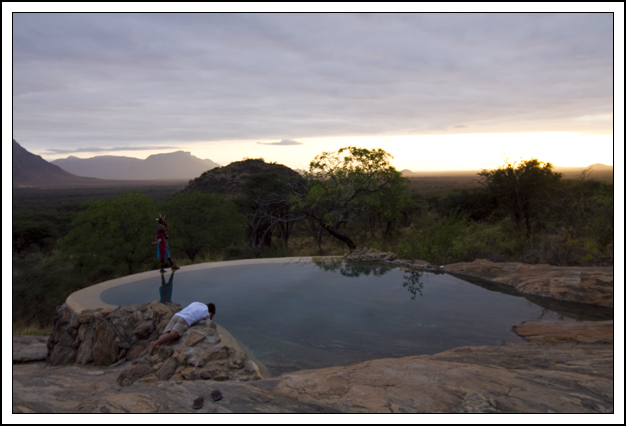We’ve lingered at Sarara for too long. Perhaps because none of us are looking forward to what we know will be a difficult drive north to Marsabit; perhaps because we’re secretly afraid of what we will find when we get there.
“The country to the north of (Archer’s Post) was considered extremely treacherous because permanent water holes were few and scattered at great distances. Moving a small army of porters across a landscape, which at times takes on a lunar appearance, was an enormous and dangerous undertaking. The desert crossing to Marsabit frightened a number of the Meru porters, and several soon deserted.
“It was Boculy who guided them over the elephant trails and led them to the crater lake on one of the mountain’s summits. As they emerged from the forest toward the wooded 200-foot-high cliffs that surrounded the lake, Osa exclaimed, “It’s paradise, Martin!” And thus the lake that had been known as Crater Lake since Smith had first seen it a quarter of a century before was given the name Lake Paradise, by which it is still known today.
“The twisted tree trunks and the dangling moss give the forest that enchanted look reminiscent of illustrations in a tale from the Brothers Grimm. There is often a haunting silence in this forest, broken only by the tolling of a far-off dove, and a calm made uneasy by the knowledge that lion, buffalo, and leopard lurk in the hidden ravines.”
Was Lake Paradise still there? Almost nothing had been written about in over 50 years and there were no recent photos.
What did it look like today? Did the forest still have “that enchanted look” and were lion, buffalo, and leopard still lurking in the ravines?
No one knew. No one we talked to had been there. All anyone ever said in regards to Lake Paradise was that it was in a dangerous country controlled by shifta bandits. “Not a good place to go,” said one expert I’d talked to. “You’d be crazy to go up there,” said another.
But it was too late to turn back now. We’d made it as far as Sarara Camp in the Mathews Range, the spot where, I imagine, Bud Cottar had argued with Blayney Percival and Martin Johnson before going back to Nairobi. Now I was with Calvin Cottar, who, perhaps even more than I, wanted to complete the safari to Lake Paradise his great uncle had abandoned for whatever reason 86 years ago.
We needed to move on. Finish the trip.
Knowing what lay ahead, Calvin had instructed us all to be up and ready to go before the break of dawn. In the chill of the morning, I dragged my safari duffle down the hillside to the mess tent. The sun was not yet up. Pete was laying on his stomach on the rocks overlooking the natural pool down below the mess tent taking photos. Casually standing on the edge of the pool was our guide for many of the past days, Philip Laresh. He was waiting for the sun to come up.
“So, today you go?” he said.
“Yes. Want to go with us?” I joked.
Philip considered it seriously. “I would very much like to go. Do you think there will be very many elephant?”
“I am hoping.”
“Maybe some old bulls,” he said. “Big tusks.”
“Perhaps.”
“Do you know,” he said, “that although I grew up here, I never saw an elephant until I was thirteen?”
“No?”
He shook his head. “They were all gone then,” he said. He stood facing the sun which was slowly creeping up between the horizon and a low bank of dark clouds. “Tembo mzuri sana.” He was silent for a moment and then he said in a low voice, “I think you will see many elephants in Marsabit. Many elephants.”
Pete clicked the last of the photos. The boys came down with their luggage, we all had a quick cup of tea, and then we were off. Headed for Lake Paradise. In hopes of seeing many, many elephants.
Tags: Sarara


Recent Comments